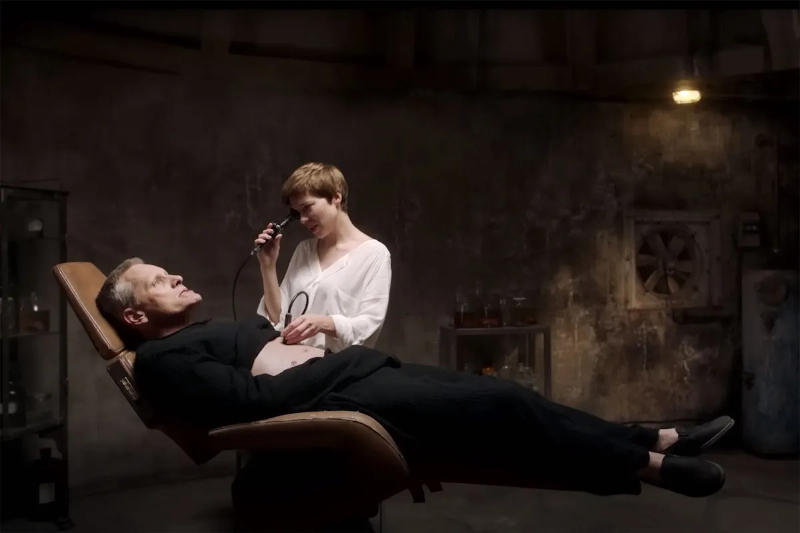Director – David Cronenberg – 2022 – Canada – Cert. 18 – 107m
*****
Even as two performance artists enact bizarre public rituals exploring the unlikely boundaries between sex, surgery and mutation, a young boy who eats plastic is murdered by his mother – out in UK cinemas on Friday, September 9th
Back in 1970, underground filmmaker Cronenberg made a film called Crimes Of The Future, inspired by the title of an unseen poem in an art film he’d seen several years earlier. That 1970 film, consisting of a cast on a campus of modernist architecture shot in colour without sync sound and deploying a monologue voice-over alternating with blocks of weird, improvised sound effects, bears little relation to this new one, except that it likewise briefly and peripherally features a dancer. More significantly, it also features a character whose body produces new organs. We don’t see them in that film, we merely hear a verbal description.
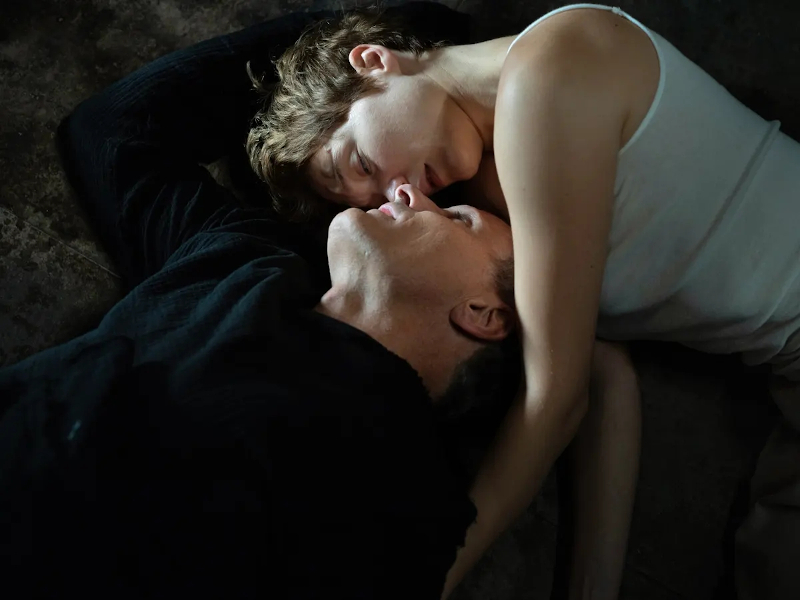
Fast-forward to the present and Cronenberg has had a career from the late 1970s through the 1990s making cinema features packed with icky special effects about something called The New Flesh followed by a series of (arguably) more mainstream, arthouse movies. To those who know the whole body of work, they’re all of a piece; however, to the newcomer they can be overwhelming or potentially offensive. These films aren’t for everyone, but to those on Cronenberg’s wavelength, he remains one of the most significant directors working today.
And so to the new Crimes Of The Future, actually a script that’s been around twenty years which producer Robert Lantos (who previously worked with Cronenberg on Crash, 1996; eXistenZ, 1999; Eastern Promises, 2007) persuaded the director to look at again and make.

The digestion system of small boy Brecken (Sotiris Siozoshas) has mutated so that he eats plastic. Horrified by this, his mother Djuna (Lihi Kornowski), regarding the child as an aberration, kills him and leaves the body as a “gift” for his estranged father Lang Dotrice (Scott Speedman).
Meanwhile, Saul Tenser (Viggo Mortensen) and partner Caprice (Léa Seydoux) are performance artists trading on his medical condition of a body regularly producing new organs which she removes surgically in live performances before an audience. Before her current career, she was a surgeon, in which capacity she saved his life. As she verbalises the couples’ creative process at public events, one recalls performance artist Vaughan (Elias Koteas) discussing celebrity car crashes in Crash.
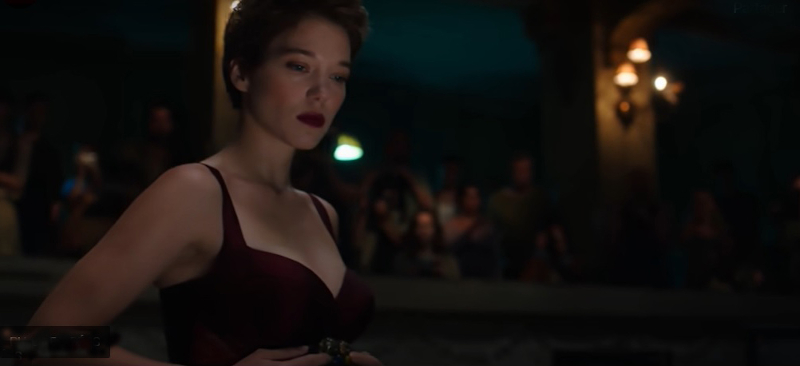
The couple find themselves crossing paths with government agency the New Organ Registry whose two bureaucrats Wippet (Canadian director Don McKellar) and Timlin (Kristen Stewart) , while wanting to log new organs for the record so as to help control them, are covert admirers of the pair’s art.
Also circling around all this is a cop named Cope (Welket Bungué) from related agency the New Vice Unit of Justice who meets regularly with Tenser at night by the rotting hulk of a ship that could be straight out of the final scene of Videodrome (Cronenberg, 1983).
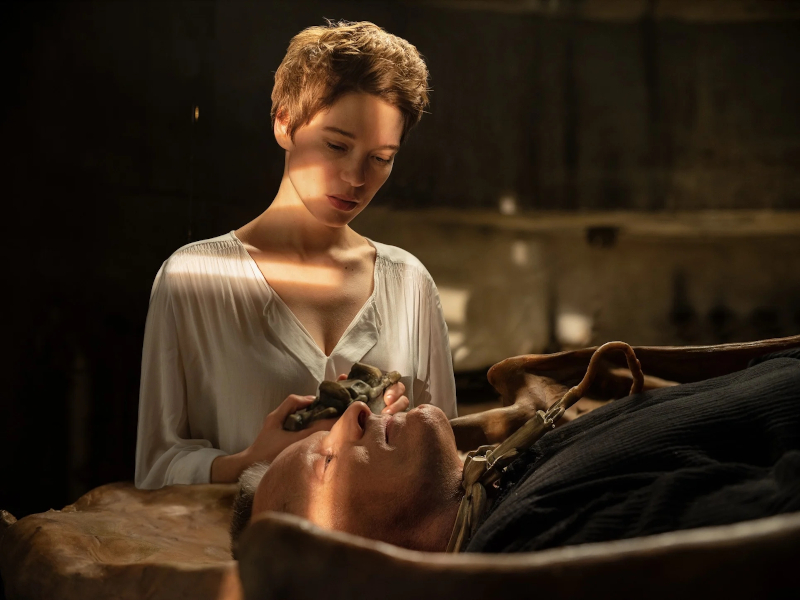
Dotrice, meanwhile, is the leader of a mysterious cult who may or may not be cannibals and involved in the production of food resembling chocolate bars, toxic for some and nourishing for others. This has echoes of the trout farm in eXistenZ. Two further female characters possessed of both a desire for the limelight and a murderous agenda all of their own are Router (Nadia Litz) and Berst (Tanaya Beatty), maintenance technicians of the various rigs employed by Tenser and Caprice to keep the former alive. As their tool and accident names imply, they are harbingers of mayhem, for which purpose they employ power drills.
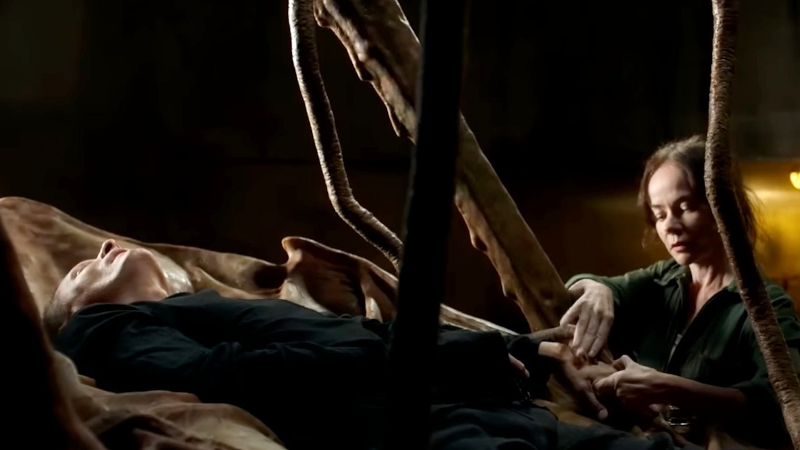
If you’re struggling to work out exactly what this is, it’s very simple: it’s a very specific genre, the David Cronenberg movie, and there’s nothing else quite like that genre out there (except, arguably, the films of his son Brandon – Antiviral, 2012; Possessor, 2020). Here, the director is once again assisted by long time collaborators production designer Carol Spier and soundtrack composer Howard Shore, both of whom have worked on most of his films since Fast Company (1979) and The Brood (1979) respectively.
Anyone who’s seen with such Cronenberg films as Naked Lunch (Cronenberg, 1991) or eXistenZ won’t be surprised by the considerable volume of prosthetics body horror special effects, while those familiar with the twin brothers in Dead Ringers (Cronenberg, 1988) or the couple at the centre of Crash will feel a certain familiarity with the dual protagonists. Organic-styled control devices resemble the games consoles of eXistenZ while chairs and pods for Tenser could have come straight out of Naked Lunch.
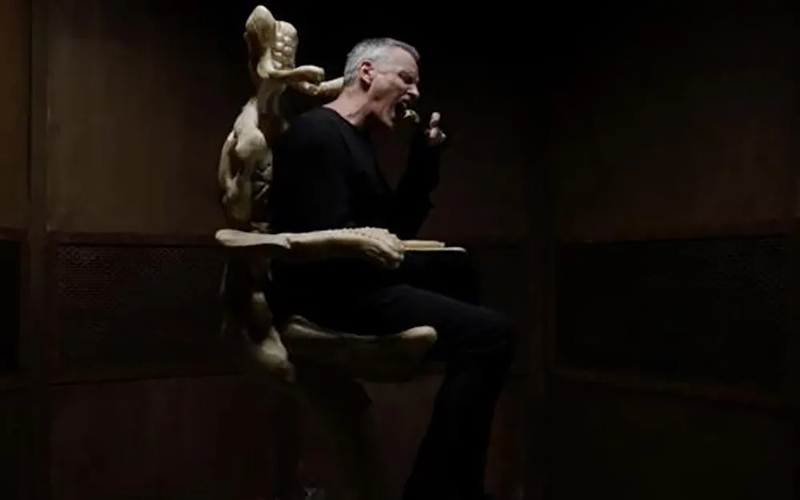
And yet, as characters whisper salaciously that “surgery is the new sex”, you’d be forgiven for thinking Cronenberg likes to shock for the sake of shock. (Perhaps he does.) However, as with his other films, his real interest lies in philosophical inquiry. This new Crimes Of The Future resembles the similarly titled 1970 underground movie in that it’s about evolution, the human race via individual human bodies breaking out of its familiar physical forms as it attempts to go in a new direction, Cronenberg’s ubiquitous New Flesh, even if he hadn’t coined the phrase that far back.
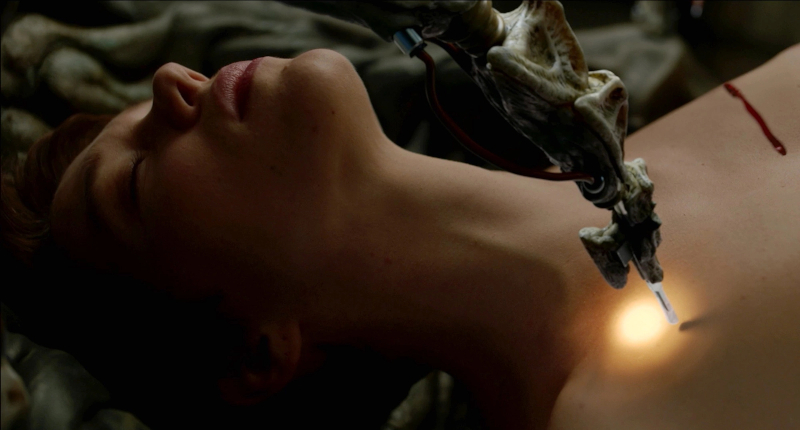
Tenser (who is indeed, at least arguably, tenser than anyone else here) spends some of his time in a bizarre, organic chair designed to help him deal with his disability (if that’s what it is), some of it in a cocoon-cum-coffin-cum-bed suspended in his room like a giant, hanging walnut and some it wandering around the shadows (strange, old world exteriors shot in Greece) wearing a long shift and race covering not unlike Arab / Muslim garb. There are sex scenes (of perverse sorts) where he and Caprice cut each other passionately with scalpels. Such scenes are at once erotic and anti-erotic, an aesthetic perfectly captured when Timlin, unexpectedly coming on to Tenser, is suddenly completely out of her depth.
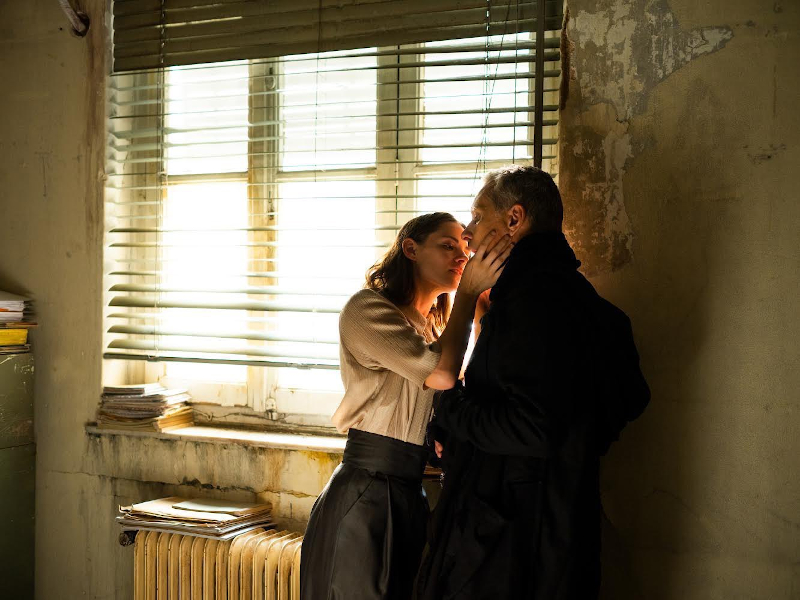
On one viewing, this writer isn’t sure how well all this hangs together – my immediate reaction is that a number of Cronenberg’s other movies referenced in this review are stronger – but far from being offended or finding the whole thing incomprehensible, as some prior viewers have done, I found myself compelled by it throughout: the moment it finished, I immediately wanted to watch it again (something that hasn’t happened to me since I saw Lost Highway (David Lynch, 1996).
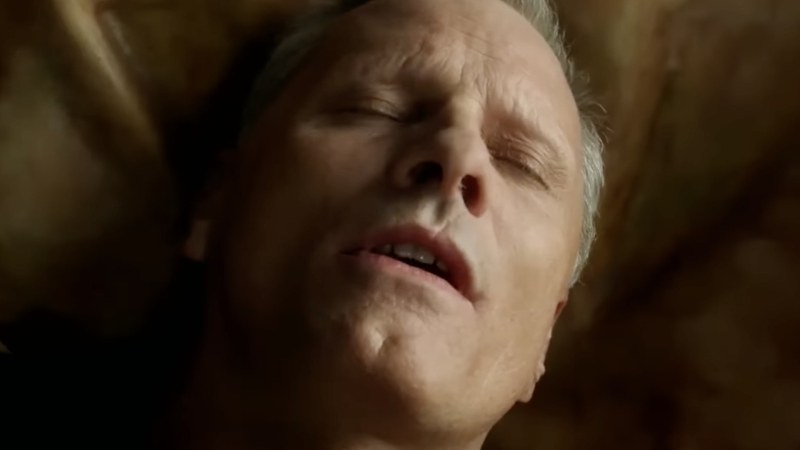
While my further viewings will no doubt clarify my thoughts on the film, there is no doubt that, as the publicity blurb suggests, David Cronenberg is back with a new entry in the genre that made his name. That genre is not science fiction (although the film is science fiction, albeit of Cronenberg’s own bizarre brand) nor is it horror (although gorehounds may have a field day) nor is it a relationship movie (although the relationships within it are never less than compelling, with amazing performances to match from the entire cast). That genre is, as previously stated, the David Cronenberg movie, and a new entry is that genre, for this writer at least, is always a welcome pleasure. Even if this one may well come to be seen, in the fullness of time, as a David Cronenberg B-movie.
Crimes Of The Future is out in cinemas in the UK on Friday, September 9th.
Trailer:
